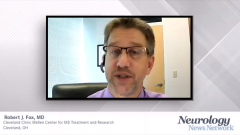
Researching Sources of Cannabis Information in Multiple Sclerosis
An expert provided context on the need to improve awareness and education on cannabis for patients with multiple sclerosis.
Episodes in this series

Transcript below.
Robert Fox, MD: I'm the managing director of a large MS patient registry called NARCOMS. We have over 40,000 people who have registered with us and the registry itself has been going for over 20 years. Not all of them still follow with us, but we follow almost 10,000 patients through a semi-annual survey, where we ask them questions about their MS and how their care has been provided.
Cannabis is not an infrequently used treatment by our patients to treat symptoms. Indeed, the American Academy of Neurology has come out with recommendations that do recognize there are some symptomatic benefits of cannabis, while also recognizing the legality of cannabis is still in this transition phase between federal and state governments. There is evidence that cannabis can be helpful for spasticity and pain related to spasticity in conditions like MS. Many of our patients do explore that as a treatment modality for their symptoms of MS.
What we saw was an unmet need in understanding where patients get their information from. Where do they learn about cannabis? How do they get educated about it? We found is that the majority of people who responded to our survey said they did share their MS care provider that they were using cannabis to treat their MS, but only a small fraction sought their care provider for information or obtained information about cannabis from their care provider. There is this market dissonance in that their care provider is providing care for their MS and is informed that they're taking cannabis, but the number 1 source of information about cannabis was the patients themselves, which is obviously not really an information source.
You only know what you know. An information source should be something outside of where you're learning. The next most common source of information was from a staff member at the dispensary. Once again, there is a market dissociation or dissonance between the care provider who knows about them using cannabis, and the source of the information, which is the dispensary providing the cannabis. It highlights an opportunity for clinicians to become more knowledgeable about cannabis, recognizing that the legality aspects are still in flux, but given that many of our patients are using it to treat their symptoms, it's important for care providers to become increasingly knowledgeable about cannabis and the various aspects around it.
Newsletter
Keep your finger on the pulse of neurology—subscribe to NeurologyLive for expert interviews, new data, and breakthrough treatment updates.














